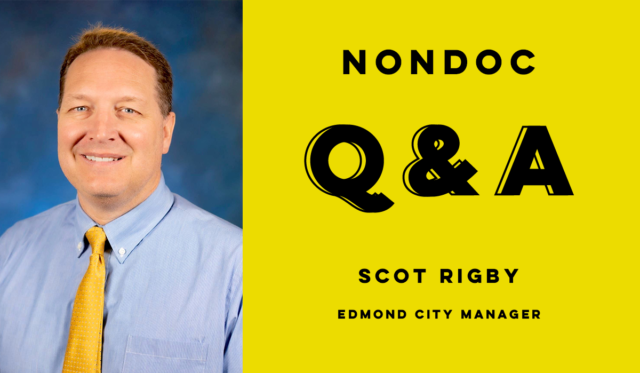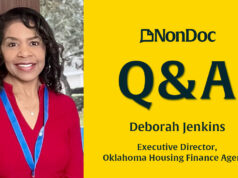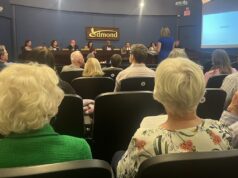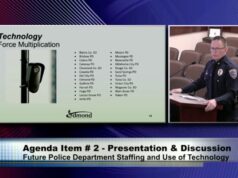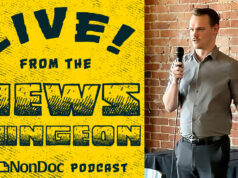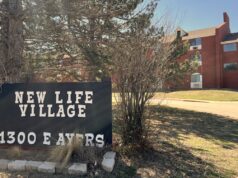
For the first time in 20 years, the City of Edmond has a new city manager.
The Edmond City Council approved hiring Scot Rigby during a Feb. 1 special meeting, and he officially started work in March. Rigby replaced former city manager Larry Stevens, who served in the position since March 2002.
Rigby graduated from Brigham Young University in 1995 with a bachelor’s degree in political science. After graduating, he moved to Queen Creek, Arizona, and worked in the town manager’s office. He then moved to Mesa, Arizona, where he filled a number of roles during his 15 years there. Most notably, Rigby worked as a senior project manager for three years in Mesa, as well as the acting assistant city manager for one year. In 2003, Rigby earned a master’s degree in public administration from Arizona State University.
Rigby then moved to Wichita, Kansas, working as the assistant city manager and director of development for six years prior to accepting the city manager job in Edmond.
In the following Q&A, Rigby talks about his path to Edmond and upcoming city projects. The conversation has been lightly edited for length, grammar and clarity.
Tell us about yourself. Where did you grow up? What is your educational and professional background?
I grew up in Alexandria, Virginia, which is directly across the river from Washington, D.C. It was a great place to grow up. My education started in public school going to Fairfax County Schools. I played sports and worked extensively all during high school with a thriving landscaping business my friends and I started.
I attended Brigham Young University for a year and took a two-year break to serve a church mission in Canada, in the Toronto, Ontario, area. I returned to school and focused on political science, thinking I would return to the D.C. area and work either for the federal government or federal contractors. While finishing BYU the last couple of years, I met my wife. My last year, I interned with the Utah House of Representatives where I learned directly how state and then local government works. Growing up in D.C., state and local government does not get covered or talked about in the news, so meeting state and local leaders was eye opening. While state politics were interesting, I grew to love local government where leaders are really the ones who deal directly with citizens on a daily basis. That interest grew into a change of focus from federal to local government.
After graduation, we moved to Arizona to begin my local government career — first, at a small town on the edge of the Phoenix metro. We then moved on to Mesa, a city of over 500,000 people. In Mesa, I was initially tasked with handing the city’s real estate services division with the task of acquiring real estate for city projects such as roads, fire/police stations, water/wastewater treatment infrastructure and other items, before transferring over to the city’s economic development division after a few years. I was asked to work with the city manager to become the city’s lead on critical special projects. These projects included the transformation of an Air Force base to a commercial airport, the development of an education campus on the former base that included several colleges. I was also tasked with negotiating and building new spring training facilities for the Chicago Cubs and Oakland Athletics, keeping those teams in Mesa for spring training. Upon that conclusion, I was recruited to join the City of Wichita in Kansas.
Wichita is the largest city in Kansas at about 400,000 residents. The assistant city manager position was a new position specially tasked with streamlining the city’s department processes and leading the city’s economic development, redevelopment, housing, planning, zoning, engineering, code and development services efforts. This also included budget and city council support. My focus was to have every department realize and understand that they are key to a city’s economic development, whether on an individual, family, business or industry level. That could include streamlining processes, procedures, adopting new efforts to reduce development timelines while enforcing development standard. Additionally, I led the effort to streamline the city’s economic development incentive guidelines, created new incentives to encourage office and industrial development and led the effort to bring affiliated baseball back to Wichita with a new stadium, medical school, culinary school, hotels, multifamily and new KU/WSU healthplex, which will educate the next generation of health care practitioners. These efforts have led Wichita to see about $1 billion of new private/public investment in downtown over the last 10 years.
What spurred your interest in public administration?
Seeing mayors, councilmembers and city managers work at the state legislature and in their city halls to tackle daily issues that impact their citizens and businesses was so interesting and exciting. I had not seen that level of government in action and quickly understood that local government is the level of government that truly impacts everyone.
As Mesa and Wichita hold between four and five times the population of Edmond, how does your job differ in a smaller city?
While those cities are larger, many of the same issues exist in Edmond, but perhaps not at the same magnitude, fiscal challenge or historical precedent. The opportunity in a smaller city like Edmond is that it provides a greater opportunity for staff, residents and businesses to develop closer relationships that can enable a city such as Edmond to move forward, often at a greater clip, to overcome roadblocks, find win-win solutions and stay in front of issues. In my role, changing from an assistant city manager to a city manager is significant, as ultimately the council and staff look to my role to make key recommendations, decisions, and set a strategic path for the organization to accomplish the council’s and the community’s vision and goals.
With the city council and staff’s current focus on growth and expansion, what excites you the most to serve as the city manager of Edmond?
Working for a community that wants to be the best in quality of life, public safety, economic vitality and educational opportunities. Many people have moved or are moving into the community because they have chosen to be in a top-tiered community, and their expectations are that Edmond will continue to be a destination for them, their families, businesses and friends. This community push and expectation helps fuel and support city staff to elevate their efforts to be the best. It is exciting to come into work in such a community.
Are there any upcoming city projects that you’re excited about?
Arcadia Lake Master Plan, Edmond 2050 Plan implementation, the various downtown projects, the expansion of the city’s water treatment plant and the Kicking Bird facility improvements are just a few that are exciting.
In your short time here thus far, what has been your favorite thing about Edmond?
Downtown, Arcadia Lake, Mitch Park, UCO, and some of the older neighborhoods that have great tree coverage. I have yet to get out to Kicking Bird, but from word of mouth from those working on the project and watching from a distance, the renovations to the golf course, courts, and indoor facilities are going to be phenomenal.
If you could magically attain Olympic-level athleticism to compete in any Winter Olympics event, which one would you choose and why?
I am not much of a winter sports fan, so I will focus on the summer games and the relatively new Olympic sport of surfing. I grew up surfing, love the ocean and enjoy the creativity that surfing provides. Perhaps I will have to learn wake surfing out at Arcadia Lake.








